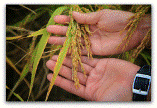Plant Pathology, Department of

Fungal Molecular Plant-Microbe Interactions
Date of this Version
2004
Document Type
Article
Citation
Microbiology (2004) 150: 2,881–2,888
doi: 10.1099/mic.0.27207-0
Abstract
In the mycotoxigenic oilseed pathogens Aspergillus flavus and Aspergillus parasiticus and the model filamentous fungus Aspergillus nidulans, unsaturated fatty acids and their derivatives act as important developmental signals that affect asexual conidiospore, sexual ascospore and/or sclerotial development. To dissect the relationship between lipid metabolism and fungal development, an A. parasiticus Δ12-desaturase mutant that was unable to convert oleic acid to linoleic acid and was thus impaired in polyunsaturated fatty acid biosynthesis was generated. The Δ12-desaturase mutant demonstrates delayed spore germination, a twofold reduction in growth, a reduced level of conidiation and complete loss of sclerotial development, compared to the wild-type. Host colonization is impaired, as reflected by a decrease in conidial production on live peanut and corn seed by the mutant compared to the wild-type. Similarly, the previously isolated A. nidulans Δ12-desaturase mutant has reduced colonization capabilities compared to the wild-type. Therefore, desaturation mutants display a key requisite that affords a genetic solution to oilseed crop contamination by mycotoxigenic Aspergillus species: a reduction in the production of conidia, the infectious particle of the pathogenic aspergilli.


Comments
The GenBank/EMBL/DDBJ accession number for the sequence reported in this paper is AF528822.